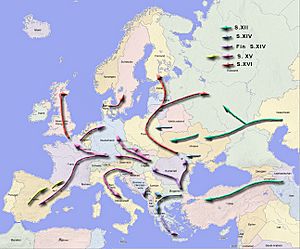Romani language facts for kids
Quick facts for kids Romani |
|
|---|---|
| romani ćhib | |
| Native to | Central and Eastern Europe and Romani diaspora |
| Native speakers | 2.5 million (2000–2004) |
| Language family |
Indo-European
|
| Recognised minority language in | (Not official language) Germany, Hungary, Sweden |
Romani or Romany is a special language spoken by the Roma and Sinti communities. Its native name is romani ćhib, which means "Romani language."
It's important not to mix up Romani with other languages. For example, it is different from Romanian, which is spoken in Romania. It's also not the same as Romansh, a language used in parts of Switzerland. Both Romanian and Romansh are Romance languages, which come from Latin. Romani, however, has a different origin.
Experts have studied the Romani language and found that it is closely related to languages spoken in central and northern India. One language it is similar to is Pothwari. This connection helps us understand where the Roma and Sinti people originally came from. By looking at words that Romani borrowed from other languages, we can also trace how they traveled west over many years.
Where is Romani Spoken?
Romani is spoken by many people across Europe and other parts of the world. It is not an official language in most countries. However, it is recognized as a minority language in places like Germany, Hungary, and Sweden.
Many Romani people live in countries such as Romania, Bulgaria, Russia, and Serbia. In these places, hundreds of thousands of people speak Romani. The language helps keep their culture and history alive.
Romani Language Family
Romani belongs to the Indo-Aryan group of languages. This group is part of the larger Indo-Iranian family, which is then part of the huge Indo-European language family. This means Romani is distantly related to many languages spoken in Europe and India.
Within Romani itself, there are many different forms, called dialects. These dialects can be quite different from each other. Some of the main dialects include:
- Balkan Romani
- Baltic Romani
- Carpathian Romani
- Finnish Kalo
- Sinte Romani
- Vlax Romani
- Welsh Romani
These dialects show how the language has changed and developed as Romani people moved to different areas.
Why is Romani Important?
The Romani language is very important for the Roma and Sinti communities. It helps them connect with their heritage and traditions. Speaking Romani helps keep their unique culture strong.
Learning about Romani also helps us understand the history of the Roma people. It shows their long journeys and how they have interacted with many different cultures. The language is a living link to their past.
See also
 In Spanish: Idioma romaní para niños
In Spanish: Idioma romaní para niños
 | Ernest Everett Just |
 | Mary Jackson |
 | Emmett Chappelle |
 | Marie Maynard Daly |


